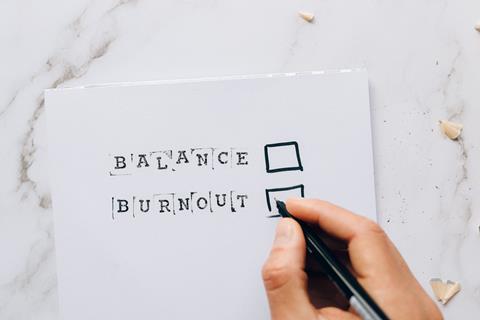The best way to thrive in an age of overwhelm is not by planning expensive spa days or exotic holidays, but incorporating everyday spiritual practices that slow us down. It’s not a luxury, but a discipleship issue, says Janice McWilliams

Phil came to my office for his therapy appointment in his usual, harried state; a nearly empty carton of take-away noodles in one hand, his phone on loudspeaker in the other.
“I have a meeting now,” he barks into the phone, “but can you get me those numbers by the end of the day? Oh, and could you set up the debrief meeting for tomorrow afternoon?”
He ends the call and flops down on the couch. I have come to expect that our sessions are squashed into his fast-paced life, but I do wonder if the man ever sits down to eat. And I’m honestly impressed that he makes this effort to tend to himself amid the chaos of his life.
Phil sighs and seems to finally really notice me. Then he takes a more deliberate, deep breath. I can tell that he’s pivoting toward the work of turning inward. I start with one of my usual opening questions: “How is your inner world today?”
It is anxiety that drives us to reopen our work email after dinner, not the prompting of the Holy Spirit
“Honestly, not good, ” he tells me. ”There are so many things to do before the close of the quarter, but I’m just praying God gets me to the finish line. It’ll be crazy, but if I can just hang on till then, I’m taking a week off and going on holiday.”
I cringe inwardly. The end of the quarter is still seven weeks away. I can’t imagine that he won’t drop down from exhaustion before then. He needs something to change now.
Phil is like so many of my clients who love Jesus but are teetering on the edge of burnout. And if there is one thing that I believe firmly about Jesus it’s this: he does not want his people to burn out. Yet an awful lot of them are, and far too few Christians really consider their pace – or that caring for themselves in this way is a discipleship issue.
Here are the three things that I see as the main culprits contributing to burn-out, and the antidotes I prescribe to combat them:
1. Waiting for the weekend vs Jesus is now
The ‘waiting for the weekend’ mindset is living at an unsustainable pace while focusing on some future break. It could be the weekend, a holiday or a sabbatical, but because the individual sees the break in the pace in the future, they don’t do anything to address their frenetic pace today. And here’s the thing. People who perpetually wait for the weekend simply resume their unsustainable pace once the break is over, so the whole cycle simply starts again.
My antidote for this is remembering that ‘Jesus is now’. I encourage my clients to choose a spiritual practice that is uplifting, but simple and quick enough to practice every day. The aim is build faith into our lives in a way that is achievable even during busy seasons. This could be listening to a short devotion on an app, praying midday prayers from the Book of Common Prayer or saying the Lord’s Prayer while driving to work. The point is to make sure this practice is daily and doable.
2. Social media self-care vs a better break
The image of self-care that is being sold to us through social media often looks like a spa day, a Netflix binge or a shopping trip. While there’s nothing inherently wrong with these activities, to prevent burn-out, we need self-care to be built into the hours and days of our lives. Social media self-care suggests occasion pampering, which is woefully inadequate for improving mental, emotional and spiritual well-being.
A better break means pausing during your day and doing something that does not add more stress hormones to your already stressed body. And here’s the rub….picking up your phone is almost certainly going to do just that. A better break might be drinking a warm drink, taking a walk, playing with your dog or meditating. It doesn’t have to take long, but re-learning to give our souls this kind of care is a dying art, and requires intentionality.
3. Spiritualised workaholism vs a swap out
Spiritualised workaholism is the trap that so many of us fall into of seeing our stressful pace as pleasing to God, when actually we are driven by anything and everything but God in the way we handle our days. Typically, it is anxiety that drives us to reopen our work email after dinner, not the prompting of the Holy Spirit. Or our sense of obligation may drive us to say yes to taking on another project, not the nudge of Jesus.
The best self-care is consistent and often, unremarkable
The swap out is a small act of surrender, in which we lay down one habit that is keeping us busy and substitute it for a practice that will fill our souls and/or slow us down. An example might be the woman who listens to work-related podcasts during her strength workouts in order to “keep sharp” in the eyes of her team. She may choose to lay down that practice and simply focus on her body instead. Or the father who swaps out his habit of taking work calls during his child’s football match and now simply focuses on the game instead.
Daily and doable
When we layer practices like this into our everyday lives, we start to feel better, bit by bit. It’s important that we choose things that are not too hard, or we won’t do them. Daily and doable is the key. The best self-care - that really prevents burn-out - is woven into our lives; it’s consistent and often, unremarkable.
But the result is a sustainable life that is fulfilling for us and pleases Jesus. After all, he came to give us “a rich and satisfying life” (John 10:10, NLT).
Phil and I created a daily, doable plan which he tackled with his usual gusto. Here’s what we crafted for him:
1. For ’Jesus is now’, Phil set an alarm on his phone mid-morning and mid-afternoon. He would pause work and spend a few minutes practicing a breath prayer: (Inhale): “Lord Jesus, king of the universe.” (Exhale): “Help me see you in life”. He did this quietly, even in a meeting, if possible.
2. Phil’s better break was to stop at midday for at least 15 minutes, during which he put his phone away, closed his laptop, ate and looked out his office window at the woodlands behind his office.
3. Phil’s swap out happened during his drive home from work. Instead of listening to the news, he listened to worship music and found himself singing to the point of elation some days, tears on others. He marveled at the power the music had to draw out his blocked up tension.
After just two week, he reported feeling different: “I feel like I’m more human….more in touch with being a creature and God being the Creator. I’m seeing that the world doesn’t fall apart when I take a lunch break. Honestly, I think I’ve been addicted to adrenaline or something. These pauses have created slow spaces in my day and it feels like pouring liquid onto my dried up soul!”
For 50 self-care practices that take five minutes or less, click here.



































No comments yet